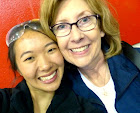
My friend Krista is dropping her college freshman daughter off at school on Sunday. This highly competent, single working mom has been hit upside the head with a plank: her youngest child will be gone in four days, which means her own life is irrevocably changing. My friend dreads the emptiness she senses just past Sunday…she realizes the opportunities inherent in ‘change’ but Krista has been emotionally gobsmacked; she was not prepared to have to explore her past and present feelings, and she has been completely immobilized by the Big Dinosaur Sitting in her Living Room…
My lifelong friend, Suzanne, flew up from Texas to clean out the house her parents built and lived in for over 50 years. I lived eight houses down from Suzanne for most of my youth, and her parent’s home was as familiar to me as my own. Suzanne’s dad died several years ago, and her mom is now living in assisted living down in Texas. Halfway through the pack-up process, Suzanne tucked herself back into her old twin bed and simply refused to get up. It was a Dinosaur Crisis! Suzanne had stumbled into a pre-history ambush. Every photo, memento and 8mm movie spun Suzanne back to her childhood, and finally forced her to witness the changes in her family (and herself) that had occurred over the last twenty-five years.
Why do we adults believe that we can handle ‘change’ with shopping lists and a few packing boxes? Our adopted children may be on to something--their hypervigilant over-reaction to transition and change may provide them with more emotional preparation than our grown-up disregard for change’s profound effects will ever provide for us. As adoptive parents, we offer a sad or scared child a safe place to talk, grieve, celebrate and plan. Perhaps we need to recognize how change provokes these connective needs within ourselves, too.
Graduation parties, weddings, funerals, baby showers, ‘gotcha’ days, coming-of-age celebrations, even kindergarten round-up; these rituals help us structure our experiences, but don’t quite finish the job of processing. Immediately after my dad died a couple of years ago, a therapist friend gave me some meaningful advice. She said, “You need to take care of yourself right now, and for the months to come.” It was so simple--but it was the heads-up I needed to understand the physical, mental and emotional impact of the grieving-integrating process I was embarking on.
It took three of us to rent Suzanne a storage unit, move her boxes and get her out of bed. Maybe we all need to form posse’s to accompany friends through our personal Jurassic Parks, and help support each other’s encounters with past history and Big Changes.
Understanding the powerful, emotional ramifications of change, and why we trigger so profoundly over both the important and the mundane (old letters between our parents, a toy we gave our 18 year old when he was in first grade, family camping trip memorabilia), opens a door and helps us find a place to put our memories, or our remorse, or the overwhelming love for individuals who have ‘left’ us. Feeling the sting of personal change, transition, or loss may also help us generate more empathic responses for our adopted children when they express (or act out) bittersweet feelings over losing their entire first lives with other families.
Dinosaurs are scary symbols of what we need to either slay or befriend (there is no escaping Jurassic Park, or the previous life choices we have made). Understanding our deeply buried, ‘ancient’ connections to events occurring today, gives us a different perspective on our surprising over-reactions, and unfreezes our ability to act.
Last month, I took my kids back to Dinosaur Ridge outside of Denver, where we gazed at real footprints made by dinos about 150 million years ago during the Jurassic Period. I like the visual symbolism of the Stegosaurus, Apatosaurus, Diplodocus, and Allosaurus footprints we saw walking the ‘Dinosaur Highway’; they remind me that beings may be gone but never forgotten, that extinction--of anything--is a process, and that remains of the past are supposed to be witnessed, studied and touched…
Jean
www.AdoptionToolbox.com
scroll down for more...









No comments:
Post a Comment